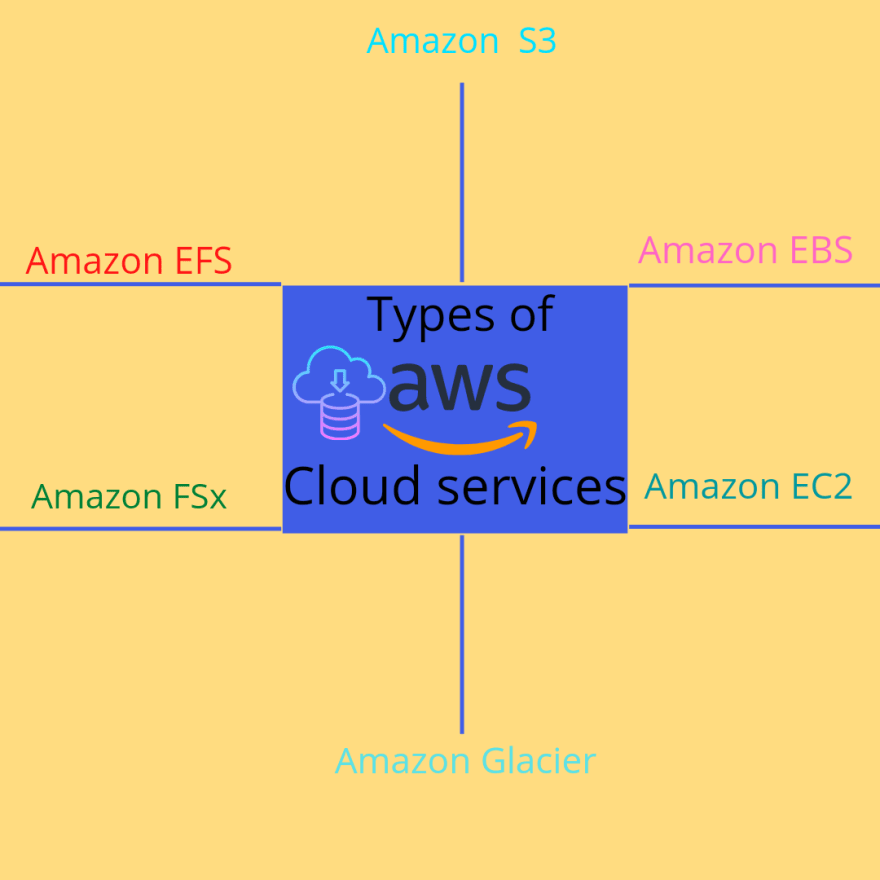What is Cloud storage ?
Cloud storage is facility that allow user to store data on Internet/ Server. It is managed by Cloud computing provider who manages and operates data storage as a service. It is managed, maintained, backed up and made available to users over a network typically, the internet. We generally pay for their cloud data storage on a per-consumption, monthly rate. Cloud storage is a virtual storage infrastructure which have accessible interfaces, near-instant elasticity and scalability, multi tenancy, and MeteredCloud (pay only for what you use) resources.
What is AWS Cloud Storage
The facility to store data on internet/server provided by Amazon Web Services is known as AWS cloud Storage. AWS storage services are low-cost data storage service with high durability and high availability. We also get the option to backing up information, archiving, and disaster recovery. The AWS Storage system provide a hybrid storage service that allows us on-premises applications to seamlessly use. We can use AWS storage service for cloud data processing, backup and archiving, disaster recovery and migration. We can also use AWS cloud storage facility to connect our applications to the service through a virtual machine or hardware gateway appliance using standard storage protocols, such as iSCSI , NFS, and SMB.
Types of AWS cloud Storage Services:
1.Amazon S3 (Simple Storage Service)
Amazon S3 is the oldest and first cloud storage service launched by AWS in 2006. It uses an object storage model that is built to store and retrieve any amount of data. Data of S3 can be accessed from anywhere on earth through mobile apps, corporate applications, websites, and data from IoT sensors or devices that can be dumped onto S3. S3 cloud storage is cost effective , easy to use ,we can also optimize costs, organize data, and configure fine-tuned access controls to meet specific business requirements.
2.Elastic File System (Amazon EFS)
Amazon EFS is a cloud-based file storage service that delivers a scalable, elastic, highly available, and highly durable network file system as-a-service. The storage capacity of EFS is elastic and can grow and shrink automatically depending on the requirement of user. It provides flexible storage capacity enhance the performance of workload that run on EC2. EFS stores data as objects and each object is stored across multiple availability zones within a region. It is more durable than S3. It has ability to make API calls. EFS supports Network File System versions 4 (NFSv4) and 4.1 (NFSv4.1). EFS can be mounted on-premises data center connected with Amazon Virtual Private Cloud (VPC) with AWS Direct Connect service.
3. Amazon Glacier
Amazon Glacier is a secure, more durable, and extremely low-cost storage service for data archiving and long-term storage. It utilize other AWS storage services such as S3, CloudFront, etc. So that it can provide better performance .It store data in the form of archives that may contain single or combination of several files together which is organized in vaults. The data of glacier can only be access by the account owner/admin however, access control can be set up for other people by defining access rules in AWS Identity and Access Management (IAM) service. In glacier storage service durability must be of utmost priority. It is designed to provide average annual durability of 99.999999999% for archives.
4. Amazon FSx
Amazon FSx offer file systems designed for a variety of workload types which is completely managed third-party file system solution. It provides a wide range of Solid-State Disk (SSD) and Hard Disk Drive (HDD) storage with optimize storage price and performance for your workload requirements. It delivers sustained high read and write speed and consistent low latency data access. It allows user to utilize rich feature sets and fast performance of widely-used open source and commercially licensed file systems. It also provides cost-efficient capacity with high levels of reliability and integrates with a broad portfolio of AWS services to enable faster innovation.
It has two file system :-1.Amazon FSx for Windows File Server 2. Amazon FSx for Luster.
5. Elastic Block Store (Amazon EBS)
AWS EBS is a storage system that store the data of EC2 instances in block level wise. It is long lasting block-level storage to be used with EC2 instances in the AWS cloud. EBS storage are used by mounting them onto EC2 instance as you will do with a physical hard drive on-premise and then format the EBS volume to the desired file system. AWS EBS provides persistent block storage for use with AWS EC2 instances in the Amazon Web Service Cloud. We must use EBS where our data is easily accessible. It allows dynamically increasing capacity, performance tuning and you can even change the type of volume with any performance impact. It also allow to save point-in-time snapshots of volumes to increases the durability of the data stored. IAM policy is needed to allow access to EBS volumes.
6. EC2 Instance Storage
Amazon EC2 is a web based service which provide scalable computing capacity in the (AWS) Cloud. It provide virtual computing environment which is known as instances. It allows businesses to run their customized application programs in the Amazon Web Services public cloud. We can launch as many virtual servers as we need by configuring security, storage management and networking in EC2 instance. Instance storage volumes are ideal for the temporary storage of data that changes frequently like queue caches, buffers, and scratch data. We can increase or decrease instance capacity as we want by using the Amazon EC2 web interface or an application programming interface (API). A developer can code an application to scale instances automatically with AWS Auto Scaling mode. We can also define an autoscaling policy and group to manage multiple instances at once. It Uses SSDs to deliver high random I/O performance, not intended to be used as durable disk storage. IAM policy is needed to be defined to permit secure control to users for performing operations like launch and termination of EC2 instances. The idea of EC2 was given by Pinkham and engineer Benjamin Black and they presented a paper on their ideas to Amazon CEO Jeff Bezos, and he liked the idea of EC2 details on virtual cloud servers. In 2006, Amazon announced a limited public beta test of EC2, and in 2007 added new instance types -- Large and Extra Large. Amazon announced the addition of static IP addresses, availability zones, and user selectable kernels in spring 2008, followed by the release of the Elastic Block Store (EBS) in August.
Benefits Of AWS Storage:
1.More Durable and Secure
2.No upfront cost it is a pay-as-you-go model.
3.Worldwide access: You can access all your data worldwide just using an internet connection.
4.Storage can be increased or decreased with changes in data size.
5.Low-cost data storage with high durability and high availability.
6.User can backup their data during disaster.
Reference:https://aws.amazon.com/products/storage/
Thanks For Reading!
Connect With Me on https://www.linkedin.com/in/shyam-prakash-mishra-5b53b6220






Top comments (0)